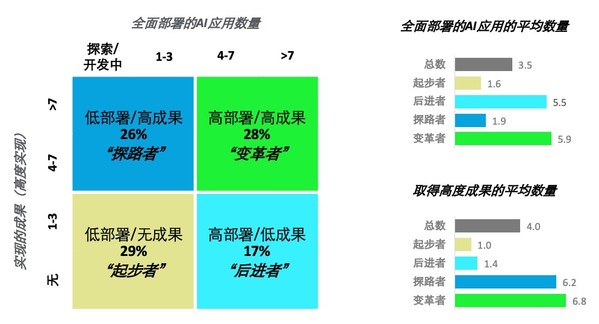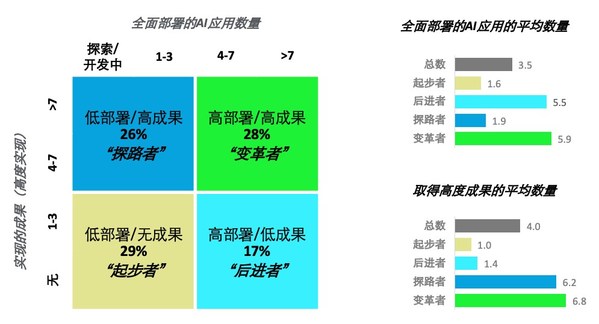Shanghai, December 21, 2021/Press Release-Xinwengao.com/ — Since 2017, the Deloitte Institute of Artificial Intelligence has initiated an investigation every year and published the “Report on the Status Quo of Enterprise Artificial Intelligence Applications”. With solid research and exclusive insights, Deloitte’s “Enterprise Artificial Intelligence Application Status Report” not only provides constructive suggestions for global enterprises to embrace artificial intelligence (hereinafter referred to as “AI”), but also becomes a window for continuous observation and analysis of global enterprise AI applications .
A few days ago, Deloitte released the 2021 “Enterprise Artificial Intelligence Application Status Report (4th Edition)”. The report surveyed 2,875 executives in 11 countries, and aimed to explore the deep-seated transformations that have taken place in companies that are committed to putting AI into practice, in order to understand how the most “AI-driven companies” can succeed. So as to help enterprises solve the pain points in the process of applying AI, no matter where they are in becoming an “AI-driven enterprise”.
The survey results found that although there are still very few “AI-driven” companies in the true sense, more than a quarter of respondents have deployed five or more types of AI applications in their companies. As companies are rapidly building AI capabilities to reach an enterprise-level scale, this extensive enterprise-level practice will lay a solid foundation and pave the way for future transformation.
Core discovery
- Companies surveyed with an enterprise-wide AI strategy and bold vision leadership are nearly 1.7 times more likely to achieve high results.
- Companies that record and execute MLOps processes are twice as likely to achieve their AI goals as other companies. They are also almost twice as likely to be fully prepared for AI-related risks.
- Companies that are highly invested in change management are 1.6 times more likely than other companies to achieve AI plans that exceed expectations, and are more than 1.5 times more likely to achieve expected goals.
- Companies with a more diverse ecosystem are 1.4 times more likely to use AI in ways that differentiate them from their competitors.
2021enterpriseTO THEMaturity overview
In order to assess the AI maturity of enterprises, Deloitte divided the interviewed companies into four types based on the number of AI application types fully deployed and the number of high-level results achieved by the interviewed companies, namely “change makers” and “pathfinders”. , “Starters” and “Laggards”.
The survey results show that 28% of the interviewed companies have become “change makers.” Such companies have shown high results and a large number of AI deployments, and have adopted leading practices related to the highest AI results to a large extent.
26% of surveyed companies are “Pathfinders.” Pathfinders have achieved fruitful results, but the small number of deployments means that they have adopted the capabilities and behaviors towards success, but have taken fewer measures, and they do not yet have the scale of changers.
17% of the interviewed companies are “latecomers.” This type of company is characterized by a large number of AI deployments, but the results obtained are poor. Although these companies have a large number of AI deployments, they have not adopted enough leading practices to help them effectively achieve meaningful results.
Another 29% of the interviewed companies can only be called “starters”, they have a small number of AI deployments. These companies started late in building AI capabilities and are least likely to demonstrate leading practices.
Deloitte based on the fully deployedThe number of AI applications and their effectiveness are used to analyze the AI maturity of the enterprise
Four categoriesAnalysis of the Differences in AI Enterprise Behavior
In order to explore the deep-seated changes that have taken place in companies that put AI into practice, Deloitte AI Research has investigated the above four types of AI companies and found differences in their strategies, operations, culture and change management, and ecosystem practices.
strategyAt the level, AI-driven companies regard AI as a key factor for business differentiation and success, and have formulated an enterprise-level strategy supported by senior management.
- Compared with starters, “AI changers” are more than three times more likely to develop an enterprise-level AI strategy than “AI starters”, and they are twice as likely to use AI in a differentiated way.
- Only 40% of respondents said that their company has developed an enterprise-level AI strategy and there is still room for improvement.
- Although 66% of respondents believe that AI is the key to success, only 38% of respondents believe that their application of AI differentiates it from their competitors.
Operational level,AI-driven companies have established new operating models to promote continuous quality, innovation and value creation.
- Companies that have made major changes to their work processes or added new roles are more than 1.5 times more likely to achieve high results.
- Companies that record and implement MLOps processes are largely twice as likely to achieve their goals as the average; they are highly prepared for AI risks nearly twice the average; they are also more confident in deploying AI in a credible manner The average level is nearly twice.
- The survey results show that only about one-third of respondents said they have adopted leading AI operations practices.
Culture and change management level,AI-driven companies cultivate a culture of trust, agility, and data fluency, and invest in change management to support new ways of working.
- Companies that have invested heavily in change management are more than 1.6 times more likely to achieve AI initiatives than expected, and are more than 1.5 times more likely to achieve expected goals.
- However, most companies lack investment in this area. Only 37% of respondents indicated that they have made a lot of investment in change management, incentives or training activities to help employees integrate new technologies into their work. This deficiency will lead to slow and unsuccessful transformations.
Ecosystem level,AI-driven companies carefully design a dynamic ecosystem to establish and protect competitive differentiation.
- 83% of high-achieving companies (“change makers” and “pathfinders”) have created a diverse ecosystem of partners to execute their AI strategies.
- Companies with diversified ecosystems are very likely to have a transformative vision for AI and enterprise-level AI strategies, and use AI as a strategic differentiator.
Key quote
“Becoming an AI-driven company is to understand that the process of transformation will never end, but a journey of continuous learning and improvement.”
— Nitin Mittal, co-leader and principal of Deloitte AI Research Institute, Deloitte Consulting LLP
“By strategically embracing AI and challenging traditional concepts, companies can develop a roadmap for AI applications, high-quality delivery and expansion, and create and unlock value more quickly.”
— Irfan Saif, co-leader and principal of Deloitte AI Research Institute, Deloitte Consulting LLP
“AI-related risks are still the top concern of executives. We have found that companies with outstanding achievements are more willing to manage AI-related risks and believe that they can deploy AI programs in a trustworthy manner.”
— Beena Ammanath, Executive Director of Deloitte AI Research Institute, Deloitte Consulting LLP
resource: Press Release Network Partners-Xinwengao.com



More Stories
Ford car sales in the US fell 6.8% in 2021 | Economy
Peruvian Juan Reynoso Says Promising the Best Cruz Azul Would “Sell Smoke” | Sports Social Networks
Hazard and Mariano, starters at Real Madrid | sports